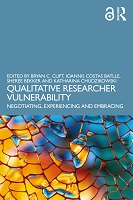Chapter 4 Supporting Emotionally Demanding Research
Proposal review
Developing Guidance for a University Research Centre
| dc.contributor.author | Smillie, Susie | |
| dc.contributor.author | Riddell, Julie | |
| dc.date.accessioned | 2023-07-27T11:38:43Z | |
| dc.date.available | 2023-07-27T11:38:43Z | |
| dc.date.issued | 2023 | |
| dc.identifier.uri | https://library.oapen.org/handle/20.500.12657/64099 | |
| dc.description.abstract | Conducting research that is emotionally demanding can negatively impact the health and wellbeing of researchers if adequate planning and support is not in place. Institutions are rigorous in their requirement for research proposals to consider physical health and safety risks to participants and researchers, and emotional risks to participants. There is less requirement for proposals to consider how the research might be emotionally demanding for those conducting it, and how this might affect them. Researchers in social and public health science at University of Glasgow identified a local need for a more consistent approach to considering emotional impact on researchers when planning, conducting, and disseminating research, and developed guidance addressing this need. This paper shares the process of, and findings from, staff consultation carried out in advance of writing guidance on ‘Facilitating and Supporting Emotionally Demanding Research’, the recommendations made within this guidance, and steps the authors have taken since then to develop a peer support network in Scotland. | en_US |
| dc.language | English | en_US |
| dc.subject.classification | thema EDItEUR::J Society and Social Sciences::JM Psychology::JMB Psychological methodology | en_US |
| dc.subject.classification | thema EDItEUR::J Society and Social Sciences::JH Sociology and anthropology::JHB Sociology::JHBC Social research and statistics | en_US |
| dc.subject.other | researcher vulnerability; vulnerability in research; research ethics; when research goes wrong; transformative learning; moments in research; vulnerability of the researcher; researchers in vulnerable positions; researcher protection; protecting researchers; harnessing vulnerability; personal research experiences; autoethnography; qualitative research; qualitative methods; vulnerability in qualitative research | en_US |
| dc.title | Chapter 4 Supporting Emotionally Demanding Research | en_US |
| dc.title.alternative | Developing Guidance for a University Research Centre | en_US |
| dc.type | chapter | |
| oapen.identifier.doi | 10.4324/9781003349266-6 | en_US |
| oapen.relation.isPublishedBy | 7b3c7b10-5b1e-40b3-860e-c6dd5197f0bb | en_US |
| oapen.relation.isPartOfBook | 2e9b7aea-7f0f-4d58-ab4d-342d0f79cad8 | en_US |
| oapen.relation.isFundedBy | 0b939896-7c25-4504-90d0-8e40954322da | en_US |
| oapen.relation.isbn | 9781032393292 | en_US |
| oapen.relation.isbn | 9781032393339 | en_US |
| oapen.imprint | Routledge | en_US |
| oapen.pages | 18 | en_US |
| peerreview.anonymity | Single-anonymised | |
| peerreview.id | bc80075c-96cc-4740-a9f3-a234bc2598f1 | |
| peerreview.open.review | No | |
| peerreview.publish.responsibility | Publisher | |
| peerreview.review.stage | Pre-publication | |
| peerreview.review.type | Proposal | |
| peerreview.reviewer.type | Internal editor | |
| peerreview.reviewer.type | External peer reviewer | |
| peerreview.title | Proposal review | |
| oapen.review.comments | Taylor & Francis open access titles are reviewed as a minimum at proposal stage by at least two external peer reviewers and an internal editor (additional reviews may be sought and additional content reviewed as required). |

